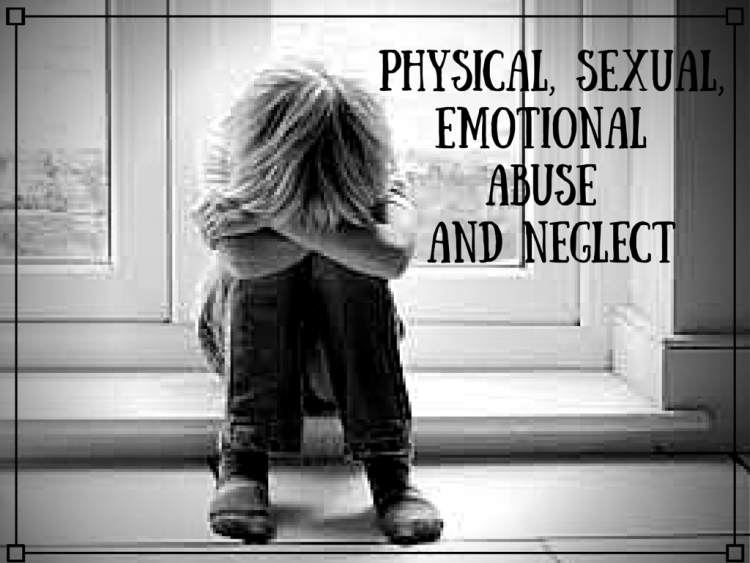
While rarely noted on preadoption referrals, we do sometimes see information that denotes a history of childhood abuse and trauma. The older the child at the time of referral and the longer time spent in a chaotic family environment and/or out-of-home care, the more likely the chances for early childhood neglect or abuse. The literature on early childhood abuse and trauma is incredibly broad, so it is difficult to condense into a short summary.
Many kids in the adoption system both domestically and internationally have experienced some degree of physical, sexual, emotional or neglectful abuse--and at the very least have been impacted by relational trauma and separation.1 The ones that are noted in writing on the preadoption referral, oftentimes have had more moderate to severe abuse as it left signs or scars that alerted the caregivers or authorities to their past history or the child has actually conveyed the abuse history to a trusted adult. A child that has documented one type of abuse, has often experienced or been exposed to multiple forms of abuse.
Major early trauma puts children at risk for behavioral, cognitive, psychological, and emotional problems long after placement including issues with self-esteem, internalizing (keeping things in) or externalizing (acting out) behaviors, developmental and social delays, and mental health issues later in life.2-4 Not everyone who is traumatized develops these sequelae, but with limited information prior to adoption, it is often hard to tell how affected they will be or how accurate the information received. Even if the abuse happened at a very young age, the impact can imprint on children even without actual memories.
If there is a history of abuse noted in the referral information, I usually advise parents to establish in-person counseling resources prior to the child coming home, specialized to help the child deal with past trauma, grief, and loss. This may need to continue throughout their lifetime.
Some books that we recommend:
1. “Adopting the Hurt Child;” Parenting the Hurt Child” Greg Keck and Regina Kupecky
2. “Parenting from the Inside Out,” Daniel Siegel and Mary Hartzell
3. “Wounded Children, Healing Homes: How Traumatized Children Impact Adoptive and Foster Families,” Jayne Schooler, Betsey Keefer Smalley, and Timothy Callahan
These books discuss trauma, attachment challenges and the difficulties of parenting children who have experienced physical and emotional separation from a caregiver and traumas in the past life, prior to coming to their adoptive families.
Once home, helping to decrease their anxiety is important. Some things that can help are to have a good structure, routine, firm boundaries, and lots of warm nurturing. Most of all, kids need parental patience, because it may take more time than expected for them to adapt, adjust to parents and the intimacy of a new family, and begin the process of healing past trauma. With major abuse, kids typically have not learned how to form a secure attachment to an adult and do not yet trust that her basic needs will be cared for - all of which will take time, patience, and guidance for them to learn. Traumatized children need to learn what safe "feels like" through consistent parental guidance and support. Regardless of the child's chronological age at the time of placement, it is helpful for parents not to assume their child already knows how to do something developmentally on-target for his or her age. Trauma and abuse can hinder social and emotional growth. The challenges are not insurmountable, but they do require parents to first provide healthy emotional, physical, psychological, and many times financial resources to come together as a family.
Summary:
*Abuse and neglect is noted in the history in varying frequencies from countries that participate in intercountry adoption.
*Moderate and severe abuse (and sometimes reported "mild" forms) will require consideration of ongoing counseling and recognition of the mental health needs of the children.
References:
1. Perry BD. Bonding and attachment in maltreate children. The Child Trauma Center. 2001;3:1-17.
2. Mullen PE, Martin JL, Anderson JC, Romans SE, Herbison GP. The long-term impact of the physical, emotional, and sexual abuse of children: a community study. Child Abuse Negl. 1996:;20(1):7-21.
3. Irish L, Kobayashi I, Delahanty DL. Long-term physical health consequences of childhood sexual abuse: A meta-analytic review. J Pediatr Psychol. 2010;35(5):450-461.
This article was generously shared by Dr. Judith Eckerle of the University of Minnesota, Adoption Medicine Clinic. Child referrals are becoming increasingly complex, and adoption medicine professionals are identifying many more children with special needs from all countries that participate in intercountry adoption, as well as from the United States. To help families prepare for these changes, Dr. Eckerle and other medical specialists are writing a book: Health Topics For Preadoptive Families.
Serving the unique medical and developmental needs of children living without consistent parental care and children who join their family though adoption.